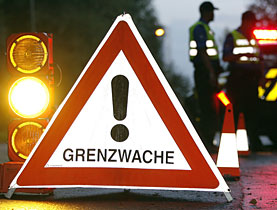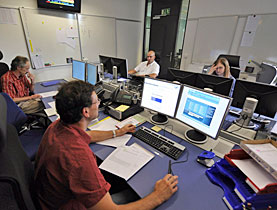Schengen Information System proves its worth

The European system aimed at closing the net on crime has had a positive effect in Switzerland since the country introduced it three months ago.
Although not a member of the European Union, Switzerland is set to join the Schengen Area in December.
Federal Police Office spokesman Guido Balmer told swissinfo that although success was difficult to measure, the system, known simply as SIS, was working well.
“It functions and we’ve found a solution which is friendly to the users – police and border guards.
“There’s no real extra work involved, that was quite important and if we can have a hit, that means we can stop people who are being sought in other countries, that’s good news,” he said.
The information system is a secure governmental database used by countries to maintain and distribute information relating to border security and law enforcement.
Border controls
Under the terms of the Schengen Agreement concluded in 1985 and 1990, systematic border controls among the participating countries – most EU countries – have been abolished.
Since the SIS database was introduced on August 14, Swiss authorities have queried it about 130,000 times a day. That yields on average about 30 hits.
In total there have been more than 2,000 hits since August, mostly in canton Zurich, Ticino, Basel City, St Gallen and Geneva.
Of those hits, the SIS has found 25 people wanted by another European country in connection with serious crimes. About 900 hits have been for people who have been denied entry into the Schengen area, while another 500 hits have been for missing persons.
“And then there is stolen property, which concerns mainly identity papers and motor vehicles that are being sought,” Balmer explained.
The database has produced about 600 hits for stolen property so far.
Thanks to the Schengen Agreement, Switzerland would no longer make systematic controls at the border and the SIS would be one of the measures used instead.
Other measures
Balmer added that other measures included checks on people not necessarily at border crossings but within a certain distance from them inside the country.
Balmer said customs checks were still being carried out at the border because Switzerland was not a part of the EU’s customs union.
The SIS is now being evaluated and Brussels will decide when Switzerland may join the whole Schengen package.
“We assume that the decision will be positive and that Switzerland will belong to the Schengen Area some time in December,” Balmer said.
Swiss authorities have called their experiences with the system so far “extremely positive”.
swissinfo, Robert Brookes
The SIS is a database containing alerts on stolen objects and persons who are wanted for extradition, who are missing or who are subject to an entry ban for a particular country.
It contains more than 13 million data records that can be accessed at any time -even at mobile controls – by the police forces, border guards and visa authorities of 24 EU member states, as well as those of Norway and Iceland.
Since August 14, Switzerland has had access to the European-wide database and has been processing inquiries for information, the correction and deletion of data in the SIS database.
International cooperation in the context of the agreement facilitates travel for individuals by eliminating systematic checks at common borders of signatory states.
At the same time, new measures have improved international cooperation between justice and police authorities to combat crime. These include security steps and tighter controls at external Schengen borders and greater cross-border police cooperation using the Schengen Information System (SIS).
Switzerland signed the Schengen accord on October 26, 2004. Swiss voters approved it on June 5, 2005 with 54.6% in favour. Evaluation of application of Schengen applications in Switzerland covers the following areas: police cooperation, SIS, data protection, securing the outer borders of Schengen (at airports) and cooperation with regard to visas.

In compliance with the JTI standards
More: SWI swissinfo.ch certified by the Journalism Trust Initiative











You can find an overview of ongoing debates with our journalists here . Please join us!
If you want to start a conversation about a topic raised in this article or want to report factual errors, email us at english@swissinfo.ch.